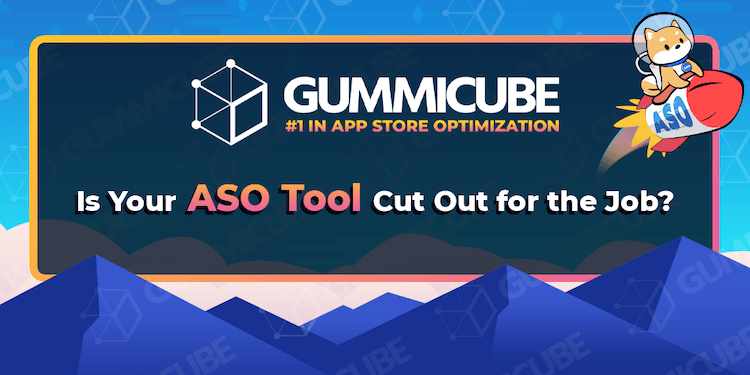There are a number of App Store Optimization (ASO) tools on the market, but unfortunately, not all of them are up to the task. A good ASO platform should be trustworthy and provide the data and features that developers require for proper App Store Optimization, but there are some out there that will not include all the information you need. This is why not every ASO tool on the market is right for you, and why you need to find one that will get the job done.
Most Tools Limit the Number of Keywords You Can Track
When you look at how an app ranks on the App Store and Google Play Store, you will want to see the full reach of its indexation. Not just the top ranked keywords, but keywords of all rankings and volumes. An app can rank for hundreds or even thousands of keywords, including additional terms the app stores merchandise an app for.
Understanding every term your app ranks for enables you to maximize growth. A full view of your keyword visibility can identify keywords your app unexpectedly ranks well for, which can be integrated into your ASO strategy. You cannot do that without complete visibility of the keywords you rank for.
There are ASO tools that put a cap on the number of keywords they will show. Even Google Play’s Developer Console only shows a selection of keywords, while the rest are sorted into “Other.” These do not provide you with the full overview of data you need. When choosing an ASO platform or tool, you’ll need one that provides visibility into all the keywords that an app ranks for.
Most Tools Use Apple Search Ads or Web Search Data
Your ASO decisions need to be driven by data. Without proper data to guide you, your optimization efforts will be misguided or flying blindly. This is why it is important to get your data from the right source. However, as Apple and Google keep their data notoriously difficult to access, many ASO tools turn to a poor substitute – typically web search data or Apple Search Ads data.
Web data is based upon terms that users search for on web search engines. This is not a suitable substitute for mobile search data, as users search on the App Store and Play Store far differently than they do on their computers’ web search engines. In fact, there is only a 20% overlap between web and mobile search data. Users tend to search for specific functionality or brands on app store searches, and for queries or actionable content on web searches. Using web search data for App Store Optimization will only provide inaccurate search volume and keywords users aren’t interested in.
It might seem as though Apple Search Ads data would be an appropriate substitute, as Search Ads is also focused on the App Store. However, using Search Ads data instead of mobile data comes with its own issues. Apple Search Ads data refreshes every 24 hours; any search volume from before that point is discarded. While this is fine for adjusting Search Ads campaigns on a daily basis, it is not applicable for long term optimization. Keywords need to have lasting volume, rather than one-day spikes.
ASO data should be based on volume and trends as they grow and diminish, rather than day by day. For instance, seasonal terms may change in popularity over time, which will not be reflected in Search Ads data. For such events, you will want to begin optimizing in advance; by the time Search Ads begins reflecting the volume for those terms, it will already be too late.
Not All Platforms Protect Your Proprietary Information
Some platforms require you to connect your app to their platform in order to use it. When doing so, these same platforms then extract your download and revenue data. This data is then sold to your competitors and is also used when building out estimates that are shared publicly.
Your playbook for the new app ecosystem [webinar]
The app stores have been cracked open. Savvy teams are already capitalizing by implementing App2Web and Web2App strategies. Join Paddle’s Lucas Lovell to discover smarter billing tactics.
Register nowThis raises a lot of trust issues on its own, especially since this type of data is not necessary for ASO. For example, increasing your overall footprint in search is dependent on the efforts put into the keyword optimization, conversion optimization and paid marketing fronts. These are all areas that do not require the revenue your company makes in order to function.
On the other end, the number of downloads you receive is a key metric in building out reporting, but you can get this information directly from your app store consoles. There is no added value in getting it from your ASO platform, unless you are a competitor who is curious in spying on this sensitive dataset.
To Conclude: Poor Data Leads to Poor Execution
Without accurate data, you will not be able to make informed decisions. App Store Optimization powered by inaccurate information can influence and set back an entire app marketing campaign.
You need to look at all the keywords your app ranks for, as well as their volume. Understanding the full scale of your visibility will help guide your decisions moving forward. The changes and decisions you make need to be based on the right data, otherwise it will lead to decisions that will negatively impact indexation.
Any change made using incorrect data, no matter how logical and thought-out the decisions may be, has a high chance of leading to bad results. ASO tools that provide incomplete or inaccurate data can lead developers to making poor decisions, which will set back their entire App Store Optimization strategy.
To ensure success, you’ll need an ASO platform that provides accurate and complete data. The data should be drawn from the right source and provide insights into all the keywords an app ranks for. Anything less will not get the job done.











